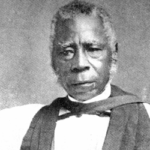PLANGE, KWESI
- 3 Min Read
Kwesi Plange (October 25, 1925-April 28, 1953) was a teacher and politician, who played an important role in Gold Coast politics during the last four years of his life.
He was born at Cape Coast in 1925, the son of John Bart-Plange and Charlotte Hagan. He was educated at the Sekondi Methodist Primary School and at St. Augustine’s College, Cape Coast, which he entered in 1936. In 1943 he went to Achimota College, studying under the sponsorship of St. Augustine’s College. He taught at St. Augustine’s College after completing his course in 1945. Though a teacher in a Catholic college, he maintained his connection with the Methodist Church. A devout Christian, he became a lay Methodist preacher but was also a strong believer in traditional African religion and customs.
When the United Gold Coast Convention (U.G.C.C.) was founded in 1947, he took a keen interest in it and was one of the teachers at St. Augustine’s College who in 1948 joined the students to stage demonstrations of protest concerning the imprisonment of Dr. J. B. Danquah and five other executive members of the U.G.C.C. by the British authorities. As a result, he and several students were dismissed from college. When Kwame Nkrumah founded the Ghana National College (which was later to become a government institution) at Cape Coast for the dismissed students at St. Augustine’s College in 1948, he was one of the first members of its staff and worked hard to make it a good school.
When the Convention People’s Party (C.P.P.) was formed by Nkrumah after the split in the U.G.C.C., Kwesi Plange joined Nkrumah in his bid to wrest power from the U.G.C.C. politicians. His first political act was to contest the Cape Coast Municipal Council seat on the Legislative Council. He defeated his opponent, who was his 60-year-old uncle, by an overwhelming majority and entered the legislature in August 1950 as the first representative of the younger generation. During the debate on the Coussey Committee’s Recommendations for constitutional reform he argued forcibly in favour of reducing the voting age from 25 to 21. His view was accepted, and it came to be regarded as his greatest contribution to the political advancement of the youth of the Gold Coast. In the general election of February 1951, he won the Cape Coast seat by a large majority, and entered the legislative assembly as a C.P.P. member for Cape Coast. He was appointed Ministerial Secretary for Local Government, and visited England in 1951 to study problems of local government. He also attended international conferences as a government representative between 1951 and 1952.
Unfortunately, while in London in 1952 he developed cancer, and was hospitalized. After several months he was declared a hopeless case. He returned to the Gold Coast in December 1952, and died in 1953, with his promise unfulfilled.
L. H. OFOSU-APPIAH



